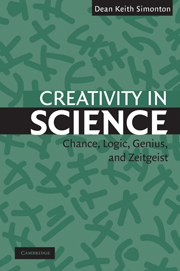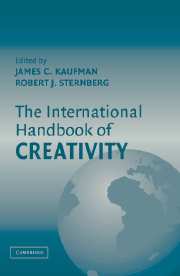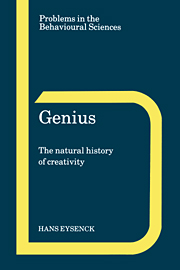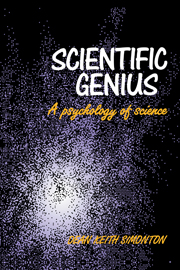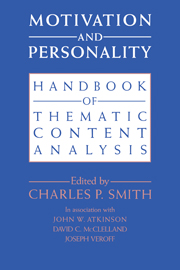Creativity in Science
Where do major scientific breakthroughs come from? Do they arise from the logic of the scientific method, or do they result from flashes of genius? Are they the products of some mysterious zeitgeist, or spirit of the times, or do they emerge from chance or serendipity? Dean Simonton provides an answer, not by choosing one explanation and ignoring the others, but rather by unifying all four perspectives into a single theory in which chance plays the primary role, but with the significant involvement of logic, genius and zeitgeist.
- Provides a comprehensive predictive and explanatory model of scientific creativity
- Integrates the four major perspectives on the phenomenon: change, logic, genius, and zeitgeist
- Synthesizes the research on scientific creativity from all theoretical, methodological, and disciplinary orientations
Reviews & endorsements
"This engaging and insightful book explores the four candidates that traditionally have been suggested to explain creativity in science. Recommended."
-R.M. Davis, Albion College, CHOICE
"Simonton is a very clear writer, and the empirical support he marshals is impressive. Although the book begins with an advisement of mathematical formulae to be used, Simonton does not bog the reader down with equations. Instead, he affirms the superiority of the change approach as an overarching explanation to scientific creativity with a thorough account of how the causal predictions based on the logic, genius, and zeitgeist perspectives ultimately contradict available data."
-Christopher H. Ramey, Department of Psychology, Florida Southern College, Philosophical Psychology
Product details
May 2004Paperback
9780521543699
234 pages
227 × 151 × 17 mm
0.33kg
11 b/w illus. 3 tables
Available
Table of Contents
- Preface
- 1. Introduction: scientific creativity
- 2. Creative products
- 3. Combinatorial processes
- 4. Scientific activity
- 5. Creative scientists
- 6. Scientific discovery
- 7. Consolidation: creativity in science
- References
- Index.

